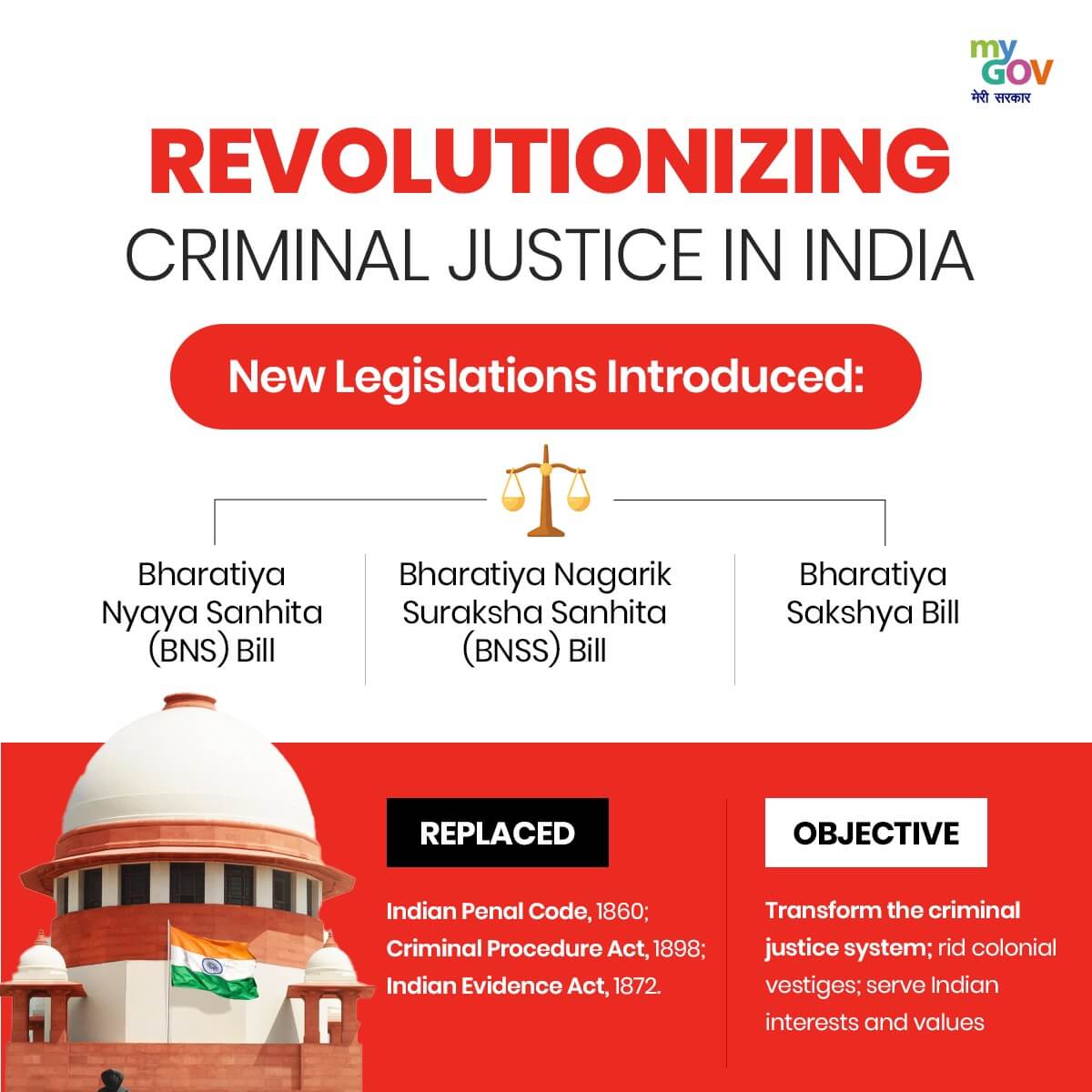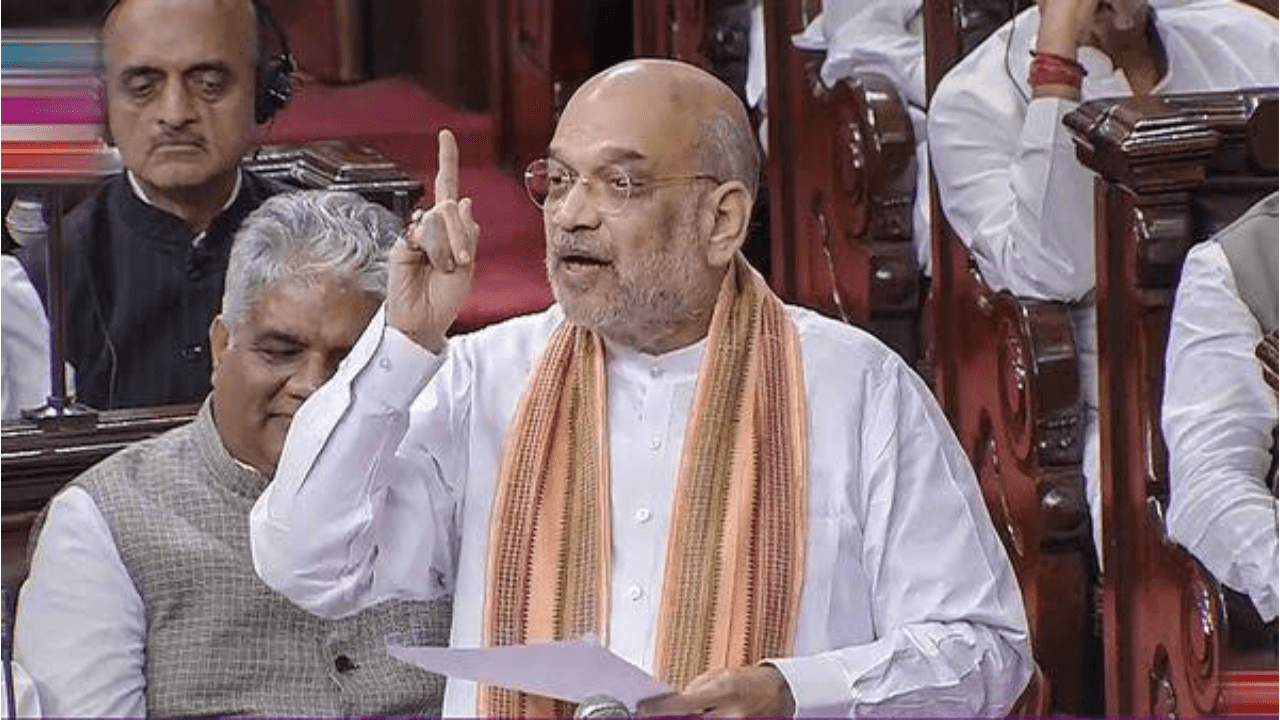The 3 New Criminal Laws – Bharatiya Nyaya Sanhita, 2023, Bharatiya Nagarik Suraksha Sanhita, 2023, and Bharatiya Sakshya Adhiniyam, 2023, come into force on 1st July. As the new Criminal Laws laid emphasis on technology in investigation, trial, and court proceedings, the National Crime Records Bureau (NCRB) has made 23 functional modifications to the existing CCTNS application.
Three New Criminal Laws
Union Home Minister and Minister of Cooperation, Shri Amit Shah, has introduced three new Bills in the Lok Sabha that propose a comprehensive revamp of the country’s criminal justice system.

These three Bills are intended to replace the existing laws: the Indian Penal Code (IPC), 1860; the Code of Criminal Procedure (CrPC), 1973; and the Indian Evidence Act, 1872.
- The IPC will be replaced by the Bharatiya Nyaya Sanhita Bill, 2023.
- The CrPC will be replaced by the Bharatiya Nagarik Suraksha Sanhita Bill, 2023.
- The Indian Evidence Act will be replaced by the Bharatiya Sakshya Bill, 2023.
Need to Revamp Criminal Justice System
- Colonial Legacy:
- The country’s criminal justice system has been operating based on laws established during British colonial rule, spanning from 1860 to 2023.
- These laws, crafted during colonial times, utilize outdated language and concepts that may not accurately align with current societal norms and values.
- Advances in Technology:
- The rapid progression of technology has introduced new dimensions to the realm of crime, evidence, and investigation.
- The evolution of technology necessitates a modernization of the legal framework to address these new challenges effectively.
- Simplification and Streamlining:
- Over time, the legal statutes have become intricate and convoluted, leading to confusion among legal practitioners, law enforcement agencies, and the general public.
- A simplified and streamlined legal framework could enhance transparency and comprehension.
- Evidence Collection and Presentation:
- The Indian Evidence Act was enacted before the emergence of modern forensic science and technological tools.
- Updating the legislation is crucial to align with current evidentiary practices and standards.
- Various Reports Highlighted the Need for Reforms in Criminal Laws:
- Various reports have underscored the necessity for reforms in the country’s criminal laws.
- The department-related Parliamentary Standing Committee on Home Affairs highlighted the need for a comprehensive review of the criminal justice system in its 146th report.
- Additionally, the committee’s 111th and 128th reports also emphasized the urgency for reforms in criminal laws.
Criminal Law Reforms Committee
The Ministry of Home Affairs initiated a significant step towards criminal law reform by forming a committee, as indicated in a notification dated May 4, 2020. The committee was entrusted with the crucial task of reviewing the three codes of criminal law in the country.
Chairman
Chaired by Prof. (Dr.) Ranbir Singh, an esteemed former Vice Chancellor of the National Law University (NLU) in Delhi, the committee brought together legal expertise to undertake this substantial undertaking.
Mandate
The committee’s primary mandate was to propose comprehensive reforms to the nation’s criminal laws, guided by principles of effectiveness and efficiency. The aim was to modernize and strengthen these laws to better serve the evolving needs of society.
Criticism
However, the committee faced criticism on several fronts. Concerns were raised regarding its lack of diversity, highlighting the importance of incorporating a broader range of perspectives. Additionally, questions arose about the transparency of its proceedings, including whether the committee operated independently from the Ministry of Home Affairs.
Despite the criticisms, the committee’s work remains a significant step toward potential criminal law reform, and its outcomes could shape the future of the country’s legal framework.
Bills Referred to a Parliamentary Standing Committee
- The introduced bills have been directed to a Parliamentary Standing Committee for a thorough review.
- This committee will meticulously examine each clause of the bills and engage in discussions on their provisions.
- Once the committee has conducted thorough deliberations on the bills, it will compile a comprehensive report containing its insights and suggestions.
- Although the government is not strictly bound to follow these recommendations, it usually considers them with a positive outlook and often integrates a significant number of them into the final legislation.
Discussion in the Parliament
- Once the committee’s recommendations are received, the government will make a determination regarding their inclusion and which specific suggestions to adopt.
- For minor changes, the government can introduce amendments to the original bills.
- If substantial modifications are required, the government might choose to withdraw the existing bills and present revised versions.
- Upon the return of the bills to the Lok Sabha, they will be subjected to thorough deliberations and discussions.
- To pass the bills, the government must secure a simple majority in the Lok Sabha.
- Following approval in the Lok Sabha, the bills will proceed to the Rajya Sabha, where they will undergo further debates and a voting process.
- Weekly Current Affairs 2025 PDF For Bank, SSC, UPSC Exams
- Unsung Heroes of India: 10 Unknown Freedom Fighters You Should Know
- 26 December Current Affairs 2023 in English
- Daily Current Affairs 2025, Check Today’s Current Affairs
- April Month Current Affairs 2024, Download PDF
- June Month Current Affairs 2024, Download PDF

Hello, I’m Aditi, the creative mind behind the words at Oliveboard. As a content writer specializing in state-level exams, my mission is to unravel the complexities of exam information, ensuring aspiring candidates find clarity and confidence. Having walked the path of an aspirant myself, I bring a unique perspective to my work, crafting accessible content on Exam Notifications, Admit Cards, and Results.
At Oliveboard, I play a crucial role in empowering candidates throughout their exam journey. My dedication lies in making the seemingly daunting process not only understandable but also rewarding. Join me as I break down barriers in exam preparation, providing timely insights and valuable resources. Let’s navigate the path to success together, one well-informed step at a time.






